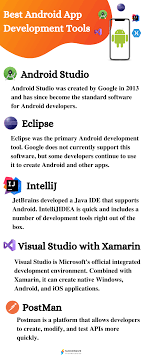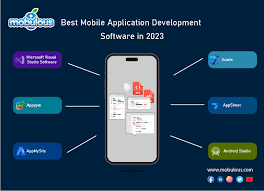Exploring the World of Google Android App Development
The World of Google Android App Development
Google’s Android operating system has become one of the most popular platforms for mobile app development. With its wide user base and powerful capabilities, creating apps for Android devices offers developers a vast opportunity to reach a global audience.
Why Develop for Android?
There are several reasons why developers choose to create apps for the Android platform:
- Market Share: Android holds a significant market share in the mobile industry, making it an attractive platform for reaching a large number of users.
- Customization: Android offers extensive customization options, allowing developers to create unique and innovative apps tailored to specific user needs.
- Open Source: The open-source nature of Android provides developers with flexibility and freedom in app development.
- Google Ecosystem: Integration with Google services like Maps, Gmail, and Play Store enhances the functionality and reach of Android apps.
The Tools of the Trade
To develop high-quality Android apps, developers typically use tools like:
- Android Studio: The official IDE for Android app development, offering a range of features and tools to streamline the development process.
- Java/Kotlin: Programming languages commonly used for building Android apps, providing robust performance and versatility.
- Android SDK: Software Development Kit containing essential libraries, documentation, and APIs for building Android applications.
The Development Process
The process of developing an Android app typically involves several key stages:
- Idea Generation: Defining the app concept, target audience, and key features.
- Design & Prototyping: Creating wireframes and mockups to visualize the app’s interface and user experience.
- Development: Writing code, implementing features, and testing the app on different devices.
- Testing & Debugging: Conducting thorough testing to identify and fix any issues or bugs in the app.
- Publishing: Uploading the app to the Google Play Store for distribution to users worldwide.
In Conclusion
In conclusion, Google Android app development offers developers a dynamic platform with vast potential for innovation and growth. By leveraging the tools and resources available within the Android ecosystem, developers can create engaging and impactful apps that resonate with users around the world.
8 Essential Tips for Successful Google Android App Development
- Understand the Android app lifecycle
- Follow Material Design guidelines for a better user experience
- Optimize app performance by reducing memory usage and battery consumption
- Use Android Jetpack components to simplify development tasks
- Test your app on various devices and screen sizes to ensure compatibility
- Implement proper security measures to protect user data
- Regularly update your app to fix bugs and introduce new features
- Engage with the Android developer community for support and knowledge sharing
Understand the Android app lifecycle
Understanding the Android app lifecycle is crucial for developers aiming to create robust and efficient applications. By comprehending how an Android app transitions through various states such as onCreate, onStart, onResume, onPause, onStop, onDestroy, developers can effectively manage resources, handle user interactions, and ensure a seamless user experience. Being aware of the intricacies of the Android app lifecycle empowers developers to optimize performance, respond to system events appropriately, and design apps that deliver consistent functionality across different devices and operating system versions.
Follow Material Design guidelines for a better user experience
Following Material Design guidelines is essential for creating a better user experience in Google Android app development. By adhering to these guidelines, developers can ensure consistency, usability, and visual appeal in their apps. Material Design principles focus on intuitive interactions, meaningful animations, and a cohesive design language that enhances user engagement. By following these guidelines, developers can create apps that not only look great but also provide a seamless and enjoyable experience for users across different Android devices.
Optimize app performance by reducing memory usage and battery consumption
To enhance the performance of your Google Android app, it is crucial to focus on optimizing memory usage and minimizing battery consumption. By reducing unnecessary memory overhead and implementing efficient coding practices, you can ensure that your app runs smoothly and consumes minimal resources. This optimization not only improves the user experience but also extends the device’s battery life, making your app more sustainable and user-friendly in the long run.
Use Android Jetpack components to simplify development tasks
By utilizing Android Jetpack components, developers can streamline and simplify various development tasks when creating Android apps. Jetpack offers a set of libraries, tools, and guidance to help developers build high-quality apps with less boilerplate code. By leveraging Jetpack components such as LiveData, ViewModel, Room, and Navigation, developers can enhance app performance, maintainability, and scalability while focusing more on creating innovative features and improving user experience.
Test your app on various devices and screen sizes to ensure compatibility
It is crucial to test your app on a variety of devices and screen sizes to guarantee compatibility. By conducting thorough testing across different devices, you can identify any potential issues related to display, functionality, or performance. This practice helps ensure that your app delivers a consistent and seamless user experience regardless of the device it is accessed on, ultimately enhancing user satisfaction and engagement.
Implement proper security measures to protect user data
When developing Google Android apps, it is crucial to implement proper security measures to safeguard user data. By prioritizing data protection, developers can ensure the confidentiality and integrity of sensitive information collected by their apps. This includes utilizing encryption techniques, implementing secure authentication processes, and adhering to best practices for data storage and transmission. By proactively addressing security concerns, developers not only protect their users’ privacy but also build trust and credibility in their app offerings.
Regularly update your app to fix bugs and introduce new features
Ensuring the success and longevity of your Android app requires a commitment to regular updates. By consistently addressing bugs and introducing new features, you not only enhance the user experience but also demonstrate your dedication to providing a polished and reliable product. Regular updates not only help in maintaining user satisfaction but also contribute to the overall growth and success of your app in the competitive market.
Engage with the Android developer community for support and knowledge sharing
Engaging with the Android developer community is a valuable tip for those involved in Google Android app development. By actively participating in forums, attending meetups, and connecting with fellow developers, individuals can access a wealth of support and knowledge sharing opportunities. This collaborative environment not only provides assistance in overcoming challenges but also fosters creativity and innovation through the exchange of ideas and best practices within the community. Embracing this tip can enhance one’s skills, expand their network, and contribute to their overall success in the dynamic field of Android app development.






